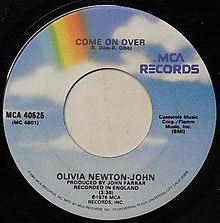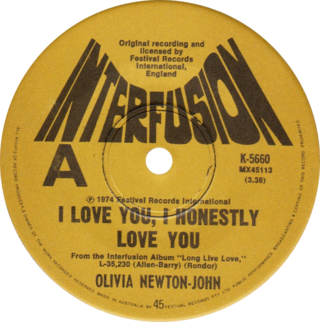
"I Honestly Love You" is a song recorded by Olivia Newton-John and released in 1974 on the album Long Live Love in the United Kingdom and If You Love Me, Let Me Know in the United States. The song became a worldwide pop hit, her first number-one single in the United States and Canada. The single was first released in Australia as "I Love You, I Honestly Love You", as per its chorus. The song was written by Jeff Barry and Australian singer and composer Peter Allen. The latter recorded it around the same time for his album Continental American.
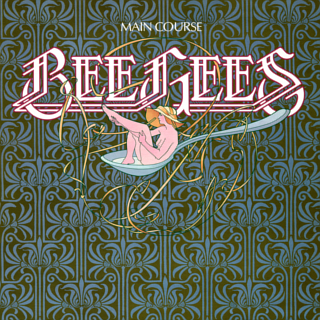
Main Course is the thirteenth studio album by the Bee Gees, released in 1975 by RSO Records. It was the group's last album to be released by Atlantic Records in the US under its distribution deal with Robert Stigwood. This album marked a great change for the Bee Gees as it was their first album to include mostly R&B, soul and funk-influenced songs, and created the model for their output through the rest of the 1970s. It rejuvenated the group's career and public image, particularly in the US, after the commercial disappointment of their preceding albums. Main Course was the first album to feature keyboardist Blue Weaver who had just left the Strawbs and toured with Mott the Hoople. The album cover with the band's new logo designed by US artist Drew Struzan made its first appearance here.

"Heartbreaker" is a song performed by American singer Dionne Warwick. It was written by Barry, Robin and Maurice Gibb of the Bee Gees for her 1982 studio album of the same name, while production was helmed by Barry Gibb, Albhy Galuten and Karl Richardson under their production moniker Gibb-Galuten-Richardson. Barry Gibb's backing vocal is heard on the chorus.

Come On Over is the seventh studio album by British-Australian singer Olivia Newton-John, released in March 1976. The album peaked at number two on the US Top Country Albums chart and number 13 on the US Billboard 200.
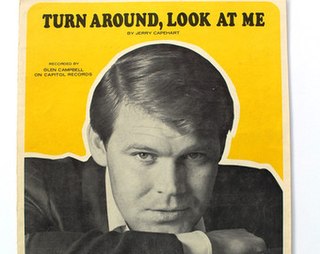
"Turn Around, Look at Me" is a song written by Jerry Capehart and Glen Campbell, though Campbell is not officially credited.
"Every Face Tells a Story" is a song originally written by Michael Allison and Peter Sills for British singer Cliff Richard, whom Olivia Newton-John was a backing singer for in the early 1970s. Richard originally attempted a recording of the song in December 1975 studio sessions for his 1976 studio album I'm Nearly Famous, but it remained unreleased. He recorded the song again for his 1977 studio album Every Face Tells a Story, for which it became the title track.

"Hopelessly Devoted to You" is a song recorded by British-Australian singer, songwriter and actress Olivia Newton-John for Grease: The Original Soundtrack from the Motion Picture (1978). It was written and produced by John Farrar and originally performed by Newton-John in the film version of the musical Grease (1978). The song was released in Australia in August 1978 and peaked at number two. It reached number three on the US Billboard Hot 100 and number seven on the Adult Contemporary chart. On the country chart, "Hopelessly Devoted to You" peaked at number 20 and was her first top 20 country hit in two years. Newton-John performed the song at the 21st Grammy Awards in 1979.
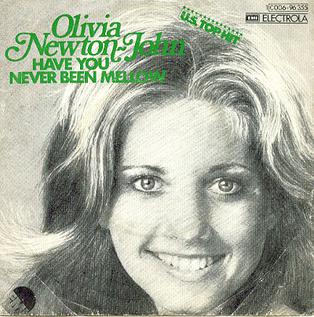
"Have You Never Been Mellow" is a song recorded by British-Australian singer Olivia Newton-John for her 1975 fifth studio album of the same name. Written and produced by John Farrar, the song was released as the lead single from the album in January 1975.
"Let It Shine" is a 1973 single written by Nashville songwriter Linda Hargrove.

"Run to Me" is a song by the Bee Gees, the lead single from the group's album To Whom It May Concern (1972). The song reached the UK Top 10 and the US Top 20.

"Fly Away" is a 1975 song written and performed by John Denver featuring vocals by Olivia Newton-John. Released as a single from the Windsong album, "Fly Away" peaked at No.13 on the Billboard Hot 100 chart and spent two weeks atop the adult contemporary chart in early-1976, Denver's sixth No.1 on this chart. "Fly Away" also peaked at No.12 on the country chart.
"What About Me?" is a 1984 song written by Kenny Rogers, producer David Foster, and singer-songwriter Richard Marx, and recorded by Rogers, Kim Carnes, and James Ingram as a trio song from Rogers' 1984 album of the same name. It was the lead single from the album and reached at number 15 on the US Billboard Hot 100 chart and at number one on the US Adult Contemporary chart, Marx's first number one hit as a songwriter.

"What Kind of Fool" is a 1981 vocal duet by singers Barbra Streisand and Barry Gibb. The song was written by Gibb and Albhy Galuten. Released as the third single from Streisand's album Guilty (1980), "What Kind of Fool" was the third consecutive top ten single from the album in the United States. "Woman in Love" reached number one on the Billboard Hot 100 chart, and the album's title track reached number three, both in late 1980. "What Kind of Fool" spent three weeks at number ten on the Hot 100 in March and April 1981. It also spent four weeks atop the Billboard adult contemporary chart.

"Please Mr. Please" is a song written by Bruce Welch and John Rostill, both members of British pop singer Cliff Richard's backing band, The Shadows. Welch had originally recorded the song himself in 1974 with no commercial success.

"If You Love Me (Let Me Know)" is a song written by John Rostill that was a 1974 hit single for Olivia Newton-John. It was her second release to hit the top 10 in the United States, reaching number 5 on the pop chart and number 2 on the Easy Listening chart. It also reached number 2 on the Billboard country chart. As with her single "Let Me Be There", Mike Sammes sings a bass harmony. It was nominated for the 1974 Country Music Association Award for Single of the Year.
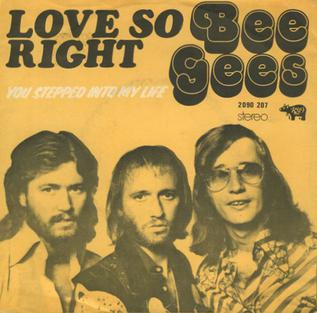
"Love So Right" is an R&B ballad recorded by the Bee Gees. It was the second single released on the album Children of the World.
"Rest Your Love on Me" is a country ballad performed by the Bee Gees and written and sung by Barry Gibb. It was the B-side of the US No. 1 hit "Too Much Heaven". Andy Gibb recorded the song as a duet with Olivia Newton-John for his 1980 album After Dark.

"Something Better to Do" is a song written by John Farrar and recorded by Olivia Newton-John. The song was released in September 1975 as the lead single from Newton-John's sixth studio album, Clearly Love. The narrator of the song muses that she's having a hard time adjusting to life without her departed lover; even the birds are wasting their songs singing to her, and until her beloved returns, "the birds will have to find something better to do."

"Don't Stop Believin'" is the title track from the 1976 album by Olivia Newton-John. Written and composed specifically for Newton-John by John Farrar. It was released in August 1976 as the album's lead single. It peaked at number thirty-three on the Billboard Hot 100. It was her seventh number one on the Easy Listening chart, spending one week at the top of the chart in September 1976. The single also went to number fourteen on the country chart.

"Don't Throw It All Away" is a song written by British musician Gary Benson and first released by the Shadows on their 1975 album Specs Appeal. Benson released his version as a single later the same year, which reached number 20 on the UK Singles Chart in the fall of 1975.
